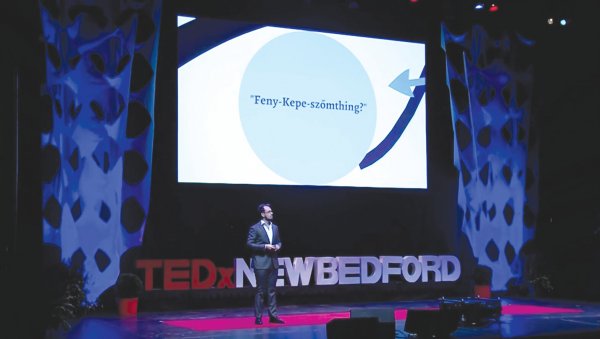Gabriel Wyner: Modern Renaissance Man
… Te voglio bene assai …
… La fleur que tu m’avais jeteé…

As an interdisciplinary double major of vocal arts performance and mechanical engineering at USC, Gabriel Wyner ’07 struggled to memorize tone, intonation and pronunciation of various languages as he walked from class to class. His studies eventually led him to develop an all-in-one language learning program called Fluent Forever.
The one-time aspiring opera singer studied every language he could to become a better performer. He started with immersion programs and began to deconstruct how they worked as opposed to typical language classes. These methods were ultimately tested when he cheated on an online placement exam and found himself enrolled in an intermediate French language immersion program, where he had to learn to speak fluently within three months. Wyner developed a tech-based crash course using open source software that not only allowed him to pass the entrance exam at the intermediate level, but also placed him in the advanced immersion program as well.
Wyner compiled his experience and research into a book, “Fluent Forever: How to Learn Any Language Fast and Never Forget It,” in 2014. Clearly, there was a demand for this kind of knowledge, with people asking about both his software and his methods. In September 2017, he used Kickstarter to develop the Fluent Forever app. By the end of the month, it had become the most funded app campaign in Kickstarter history, and it has continued on Indiegogo, attracting over $1.5 million in supporting funds from more than 6,000 supporters.
Fluent Forever uses immersion rather than the traditional approach of direct translations of native speech to foreign speech. Users of the app are expected to first learn the pronunciation of a language, much like how babies recognize accents before they even speak, then learn vocabulary and grammar structure through image and contextual association.
This immersion is cemented through a spaced repetition memorization technique, a process by which users revisit learned information just before the brain is about to forget it. This forces the brain to form and recall long-term memories at a much faster pace. The app manifests the collection of these techniques into a customizable flashcard tool that allows users to select their own curated content of images and phrases to learn any degree of these languages. If they don’t know where to start, they can pull from templates to get started.
“Memories are fascinating things,” Wyner said in a TEDx Talk in 2017. “They’re not stored in any particular area of your brain, they’re actually stored in the connections between regions in your brain.”
After all, words differ in the way they are used connotatively in speech. That connotation is derived from the experiences in which that word appears. It is the same way one would use the word “synonymous” in some situations and “similar” in others. While the two words have an interchangeable definition, one is considered academic while the other is casual. We develop this tonal association through experiencing the word in those specific contexts. Language translation also deals with this spectrum of meaning tied closely with experience and culture.
“Language is so important to people. It’s not just a communication method — it’s cultural preservation,” Wyner said.
For instance, the French “la douleur exquise” translates literally to “exquisite pain.” But in fact, it refers to heart-wrenching pain of being in love with someone you can’t have. It’s the ache at the depths of “la douleur exquise” that even the English term “unrequited love” doesn’t quite capture.
Wyner’s approach to immersion is an attempt to form those links between foreign words and their experiences. Once the connections are made, you can think in the language you’re studying rather than translating word for word and stumbling over connotations.
“I thought I was going to be an opera singer, and I really like engineering. Where I find myself today is not the path I had set,” Wyner said. “Seeing what’s right in front of you and being able to assess where to go next, not based on where you think you should go, but to pave your own path based on what life throws at you.”
Though he is neither an opera singer nor an engineer in the classical sense, Wyner considers himself an “education engineer,” and says it was the engineering mindset that allowed him to create a solution to a problem he had found through his interest in music.
“How do you look at a real problem and use math and physics to find a solution? That mindset is really powerful. It’s something I got from my education at USC,” he said.



